Palm Beach Academy: Factors Motivating Adult Learners Report
VerifiedAdded on 2022/09/28
|12
|3127
|18
Report
AI Summary
This report examines the factors that motivate adult learners in higher education, focusing on Palm Beach Academy. It begins by defining adult learners and outlining the challenges they face, such as time constraints and conflicting obligations. The study aims to determine factors that motivate adult learners, explore their course preferences, and assess the influence of rewards like promotions and increased income. The research employs a qualitative approach using questionnaires to gather data from adult learners. The methodology includes a detailed design of the study, setting, and the use of a questionnaire as the primary instrument. The report reviews relevant literature on adult learning, motivation models, and the importance of considering the diverse needs of adult students. The findings are expected to provide valuable insights for educators and institutions to better support and motivate adult learners in achieving their career goals. The report highlights the importance of understanding adult learners' perspectives and the impact of both internal and external factors on their motivation. The research also emphasizes the need for structured approaches to support adult learners and to promote their academic engagement and success.

The Learner
Paraphrase This Document
Need a fresh take? Get an instant paraphrase of this document with our AI Paraphraser
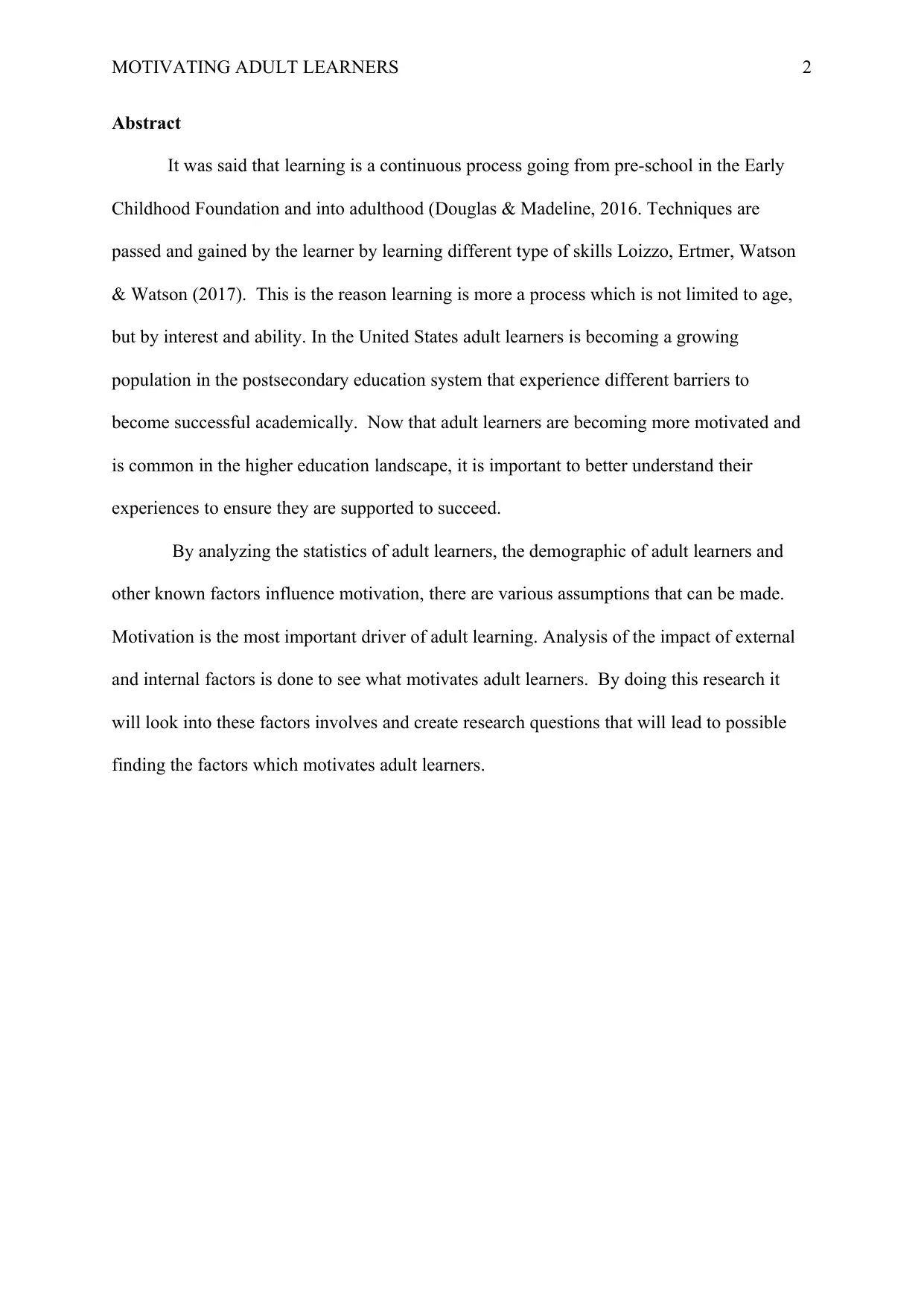
MOTIVATING ADULT LEARNERS
Abstract
It was said that learning is a continuous process going from pre-school in the Early
Childhood Foundation and into adulthood (Douglas & Madeline, 2016. Techniques are
passed and gained by the learner by learning different type of skills Loizzo, Ertmer, Watson
& Watson (2017). This is the reason learning is more a process which is not limited to age,
but by interest and ability. In the United States adult learners is becoming a growing
population in the postsecondary education system that experience different barriers to
become successful academically. Now that adult learners are becoming more motivated and
is common in the higher education landscape, it is important to better understand their
experiences to ensure they are supported to succeed.
By analyzing the statistics of adult learners, the demographic of adult learners and
other known factors influence motivation, there are various assumptions that can be made.
Motivation is the most important driver of adult learning. Analysis of the impact of external
and internal factors is done to see what motivates adult learners. By doing this research it
will look into these factors involves and create research questions that will lead to possible
finding the factors which motivates adult learners.
2
Abstract
It was said that learning is a continuous process going from pre-school in the Early
Childhood Foundation and into adulthood (Douglas & Madeline, 2016. Techniques are
passed and gained by the learner by learning different type of skills Loizzo, Ertmer, Watson
& Watson (2017). This is the reason learning is more a process which is not limited to age,
but by interest and ability. In the United States adult learners is becoming a growing
population in the postsecondary education system that experience different barriers to
become successful academically. Now that adult learners are becoming more motivated and
is common in the higher education landscape, it is important to better understand their
experiences to ensure they are supported to succeed.
By analyzing the statistics of adult learners, the demographic of adult learners and
other known factors influence motivation, there are various assumptions that can be made.
Motivation is the most important driver of adult learning. Analysis of the impact of external
and internal factors is done to see what motivates adult learners. By doing this research it
will look into these factors involves and create research questions that will lead to possible
finding the factors which motivates adult learners.
2
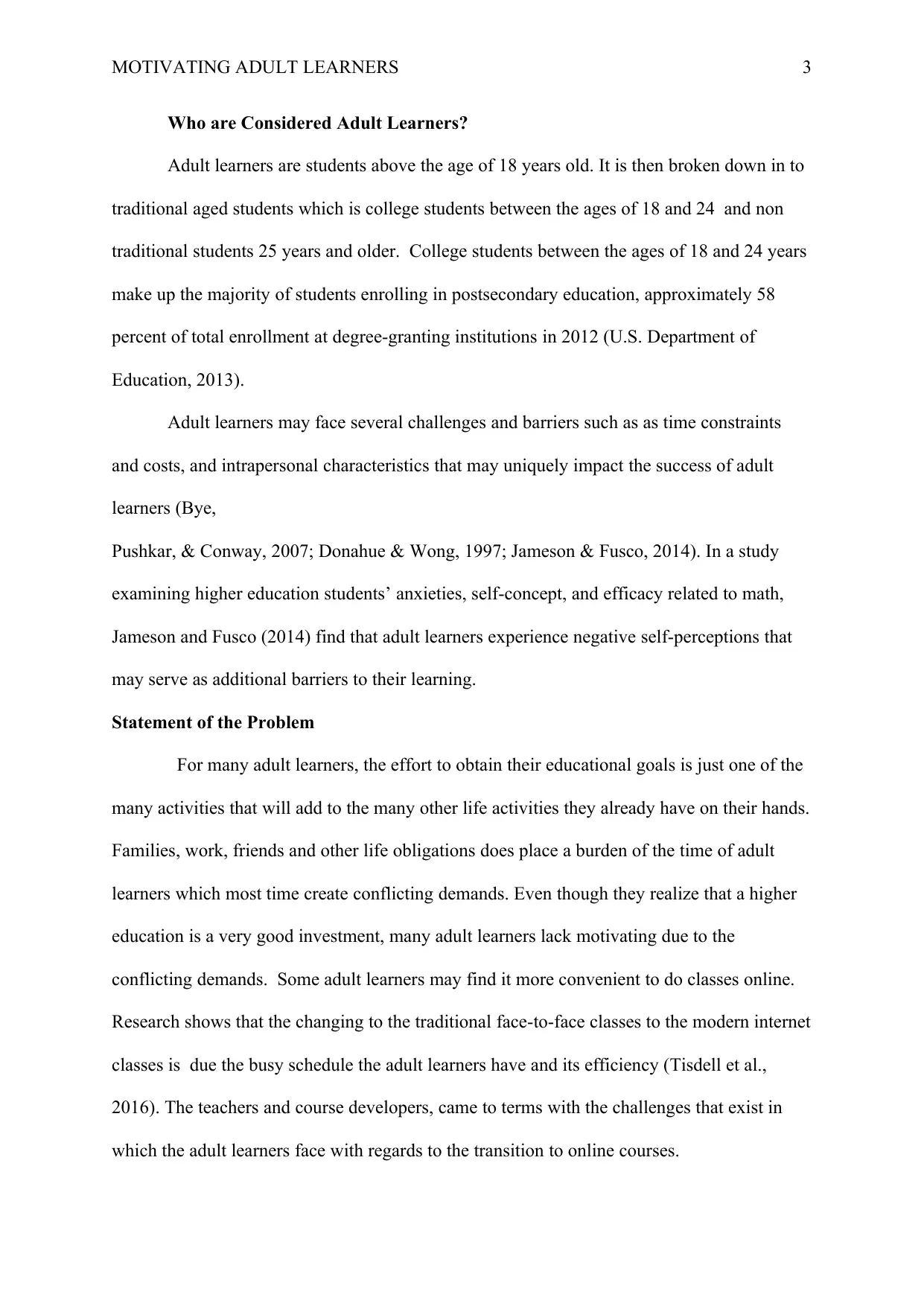
MOTIVATING ADULT LEARNERS
Who are Considered Adult Learners?
Adult learners are students above the age of 18 years old. It is then broken down in to
traditional aged students which is college students between the ages of 18 and 24 and non
traditional students 25 years and older. College students between the ages of 18 and 24 years
make up the majority of students enrolling in postsecondary education, approximately 58
percent of total enrollment at degree-granting institutions in 2012 (U.S. Department of
Education, 2013).
Adult learners may face several challenges and barriers such as as time constraints
and costs, and intrapersonal characteristics that may uniquely impact the success of adult
learners (Bye,
Pushkar, & Conway, 2007; Donahue & Wong, 1997; Jameson & Fusco, 2014). In a study
examining higher education students’ anxieties, self-concept, and efficacy related to math,
Jameson and Fusco (2014) find that adult learners experience negative self-perceptions that
may serve as additional barriers to their learning.
Statement of the Problem
For many adult learners, the effort to obtain their educational goals is just one of the
many activities that will add to the many other life activities they already have on their hands.
Families, work, friends and other life obligations does place a burden of the time of adult
learners which most time create conflicting demands. Even though they realize that a higher
education is a very good investment, many adult learners lack motivating due to the
conflicting demands. Some adult learners may find it more convenient to do classes online.
Research shows that the changing to the traditional face-to-face classes to the modern internet
classes is due the busy schedule the adult learners have and its efficiency (Tisdell et al.,
2016). The teachers and course developers, came to terms with the challenges that exist in
which the adult learners face with regards to the transition to online courses.
3
Who are Considered Adult Learners?
Adult learners are students above the age of 18 years old. It is then broken down in to
traditional aged students which is college students between the ages of 18 and 24 and non
traditional students 25 years and older. College students between the ages of 18 and 24 years
make up the majority of students enrolling in postsecondary education, approximately 58
percent of total enrollment at degree-granting institutions in 2012 (U.S. Department of
Education, 2013).
Adult learners may face several challenges and barriers such as as time constraints
and costs, and intrapersonal characteristics that may uniquely impact the success of adult
learners (Bye,
Pushkar, & Conway, 2007; Donahue & Wong, 1997; Jameson & Fusco, 2014). In a study
examining higher education students’ anxieties, self-concept, and efficacy related to math,
Jameson and Fusco (2014) find that adult learners experience negative self-perceptions that
may serve as additional barriers to their learning.
Statement of the Problem
For many adult learners, the effort to obtain their educational goals is just one of the
many activities that will add to the many other life activities they already have on their hands.
Families, work, friends and other life obligations does place a burden of the time of adult
learners which most time create conflicting demands. Even though they realize that a higher
education is a very good investment, many adult learners lack motivating due to the
conflicting demands. Some adult learners may find it more convenient to do classes online.
Research shows that the changing to the traditional face-to-face classes to the modern internet
classes is due the busy schedule the adult learners have and its efficiency (Tisdell et al.,
2016). The teachers and course developers, came to terms with the challenges that exist in
which the adult learners face with regards to the transition to online courses.
3
⊘ This is a preview!⊘
Do you want full access?
Subscribe today to unlock all pages.

Trusted by 1+ million students worldwide
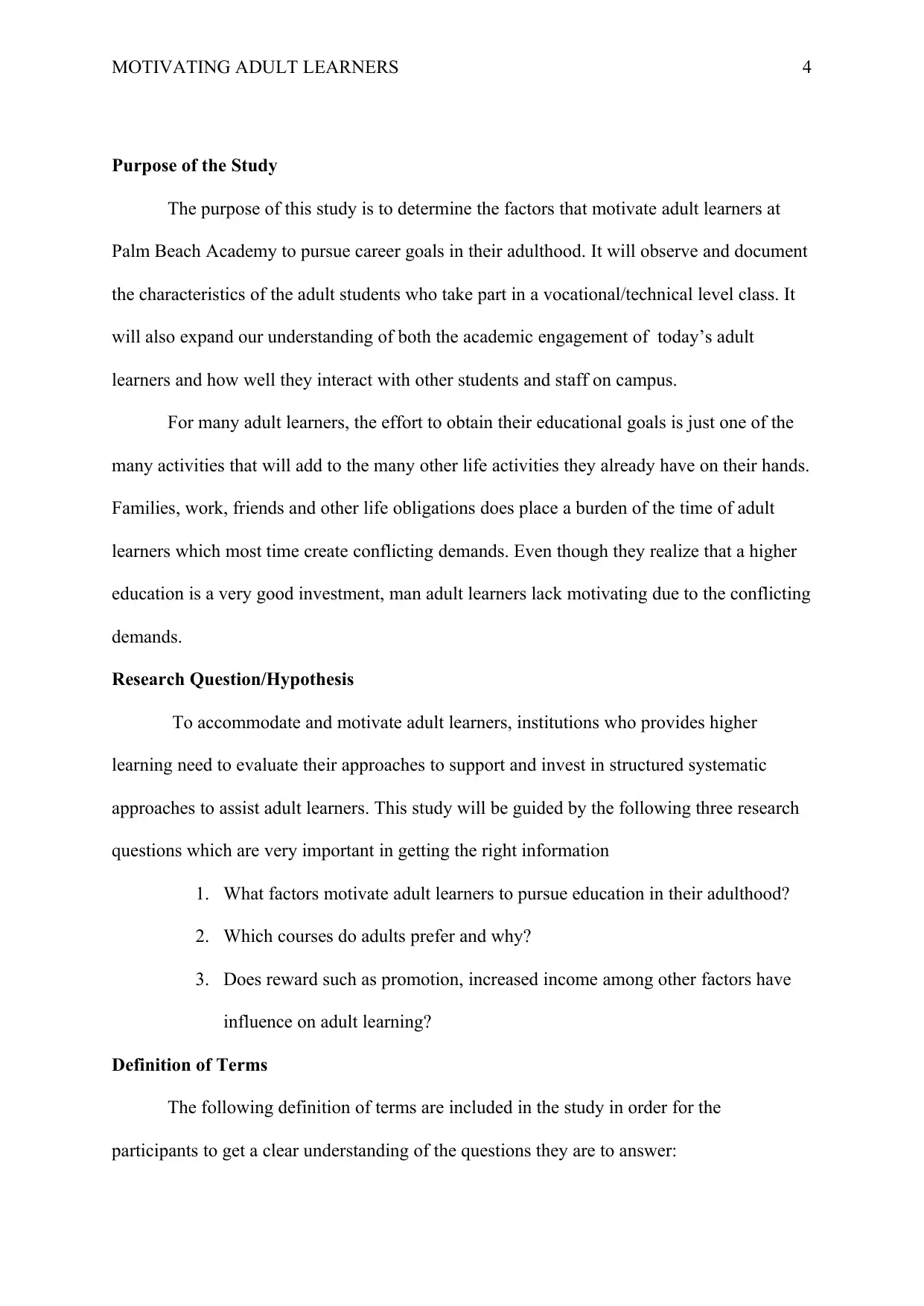
MOTIVATING ADULT LEARNERS
Purpose of the Study
The purpose of this study is to determine the factors that motivate adult learners at
Palm Beach Academy to pursue career goals in their adulthood. It will observe and document
the characteristics of the adult students who take part in a vocational/technical level class. It
will also expand our understanding of both the academic engagement of today’s adult
learners and how well they interact with other students and staff on campus.
For many adult learners, the effort to obtain their educational goals is just one of the
many activities that will add to the many other life activities they already have on their hands.
Families, work, friends and other life obligations does place a burden of the time of adult
learners which most time create conflicting demands. Even though they realize that a higher
education is a very good investment, man adult learners lack motivating due to the conflicting
demands.
Research Question/Hypothesis
To accommodate and motivate adult learners, institutions who provides higher
learning need to evaluate their approaches to support and invest in structured systematic
approaches to assist adult learners. This study will be guided by the following three research
questions which are very important in getting the right information
1. What factors motivate adult learners to pursue education in their adulthood?
2. Which courses do adults prefer and why?
3. Does reward such as promotion, increased income among other factors have
influence on adult learning?
Definition of Terms
The following definition of terms are included in the study in order for the
participants to get a clear understanding of the questions they are to answer:
4
Purpose of the Study
The purpose of this study is to determine the factors that motivate adult learners at
Palm Beach Academy to pursue career goals in their adulthood. It will observe and document
the characteristics of the adult students who take part in a vocational/technical level class. It
will also expand our understanding of both the academic engagement of today’s adult
learners and how well they interact with other students and staff on campus.
For many adult learners, the effort to obtain their educational goals is just one of the
many activities that will add to the many other life activities they already have on their hands.
Families, work, friends and other life obligations does place a burden of the time of adult
learners which most time create conflicting demands. Even though they realize that a higher
education is a very good investment, man adult learners lack motivating due to the conflicting
demands.
Research Question/Hypothesis
To accommodate and motivate adult learners, institutions who provides higher
learning need to evaluate their approaches to support and invest in structured systematic
approaches to assist adult learners. This study will be guided by the following three research
questions which are very important in getting the right information
1. What factors motivate adult learners to pursue education in their adulthood?
2. Which courses do adults prefer and why?
3. Does reward such as promotion, increased income among other factors have
influence on adult learning?
Definition of Terms
The following definition of terms are included in the study in order for the
participants to get a clear understanding of the questions they are to answer:
4
Paraphrase This Document
Need a fresh take? Get an instant paraphrase of this document with our AI Paraphraser
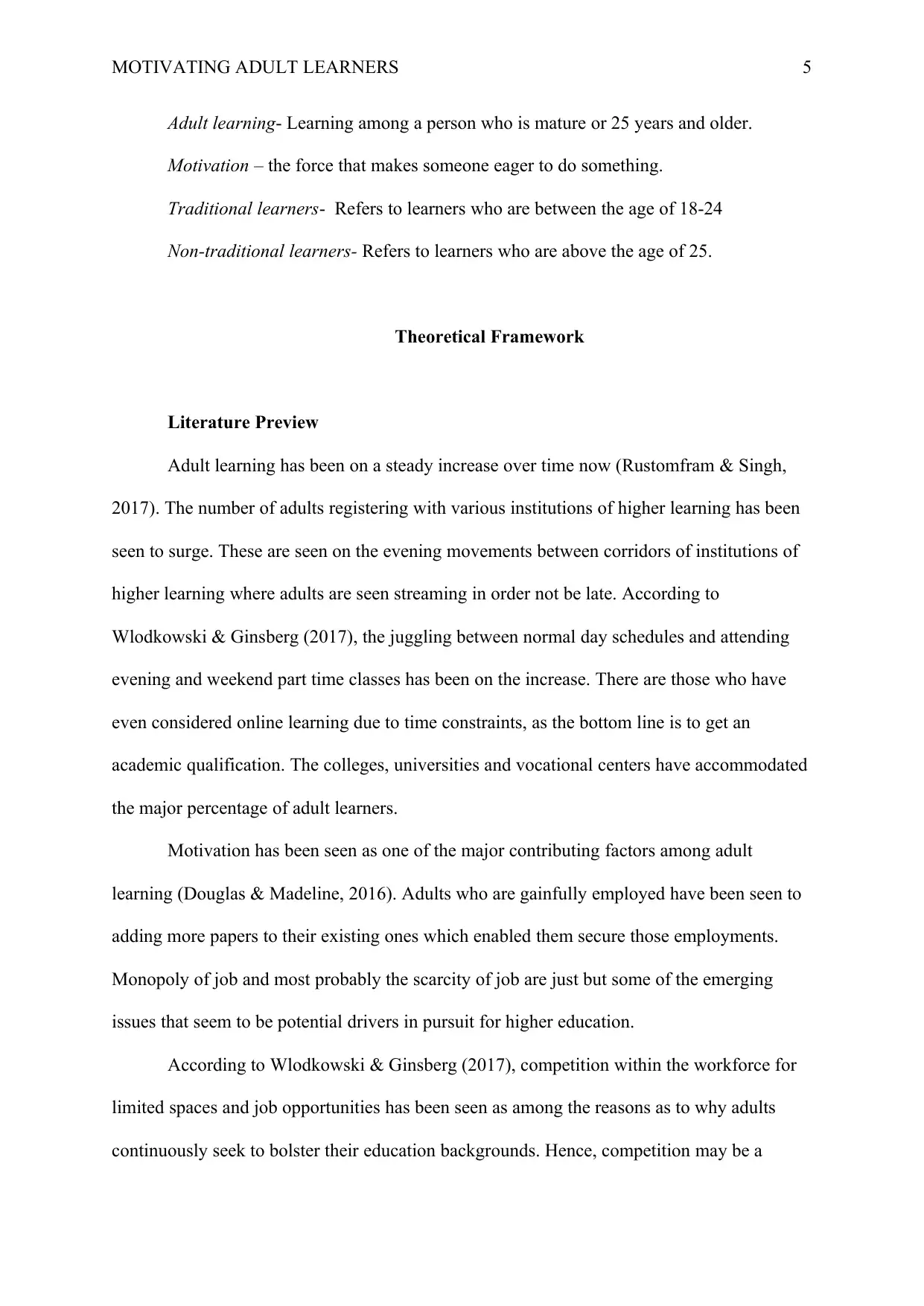
MOTIVATING ADULT LEARNERS
Adult learning- Learning among a person who is mature or 25 years and older.
Motivation – the force that makes someone eager to do something.
Traditional learners- Refers to learners who are between the age of 18-24
Non-traditional learners- Refers to learners who are above the age of 25.
Theoretical Framework
Literature Preview
Adult learning has been on a steady increase over time now (Rustomfram & Singh,
2017). The number of adults registering with various institutions of higher learning has been
seen to surge. These are seen on the evening movements between corridors of institutions of
higher learning where adults are seen streaming in order not be late. According to
Wlodkowski & Ginsberg (2017), the juggling between normal day schedules and attending
evening and weekend part time classes has been on the increase. There are those who have
even considered online learning due to time constraints, as the bottom line is to get an
academic qualification. The colleges, universities and vocational centers have accommodated
the major percentage of adult learners.
Motivation has been seen as one of the major contributing factors among adult
learning (Douglas & Madeline, 2016). Adults who are gainfully employed have been seen to
adding more papers to their existing ones which enabled them secure those employments.
Monopoly of job and most probably the scarcity of job are just but some of the emerging
issues that seem to be potential drivers in pursuit for higher education.
According to Wlodkowski & Ginsberg (2017), competition within the workforce for
limited spaces and job opportunities has been seen as among the reasons as to why adults
continuously seek to bolster their education backgrounds. Hence, competition may be a
5
Adult learning- Learning among a person who is mature or 25 years and older.
Motivation – the force that makes someone eager to do something.
Traditional learners- Refers to learners who are between the age of 18-24
Non-traditional learners- Refers to learners who are above the age of 25.
Theoretical Framework
Literature Preview
Adult learning has been on a steady increase over time now (Rustomfram & Singh,
2017). The number of adults registering with various institutions of higher learning has been
seen to surge. These are seen on the evening movements between corridors of institutions of
higher learning where adults are seen streaming in order not be late. According to
Wlodkowski & Ginsberg (2017), the juggling between normal day schedules and attending
evening and weekend part time classes has been on the increase. There are those who have
even considered online learning due to time constraints, as the bottom line is to get an
academic qualification. The colleges, universities and vocational centers have accommodated
the major percentage of adult learners.
Motivation has been seen as one of the major contributing factors among adult
learning (Douglas & Madeline, 2016). Adults who are gainfully employed have been seen to
adding more papers to their existing ones which enabled them secure those employments.
Monopoly of job and most probably the scarcity of job are just but some of the emerging
issues that seem to be potential drivers in pursuit for higher education.
According to Wlodkowski & Ginsberg (2017), competition within the workforce for
limited spaces and job opportunities has been seen as among the reasons as to why adults
continuously seek to bolster their education backgrounds. Hence, competition may be a
5
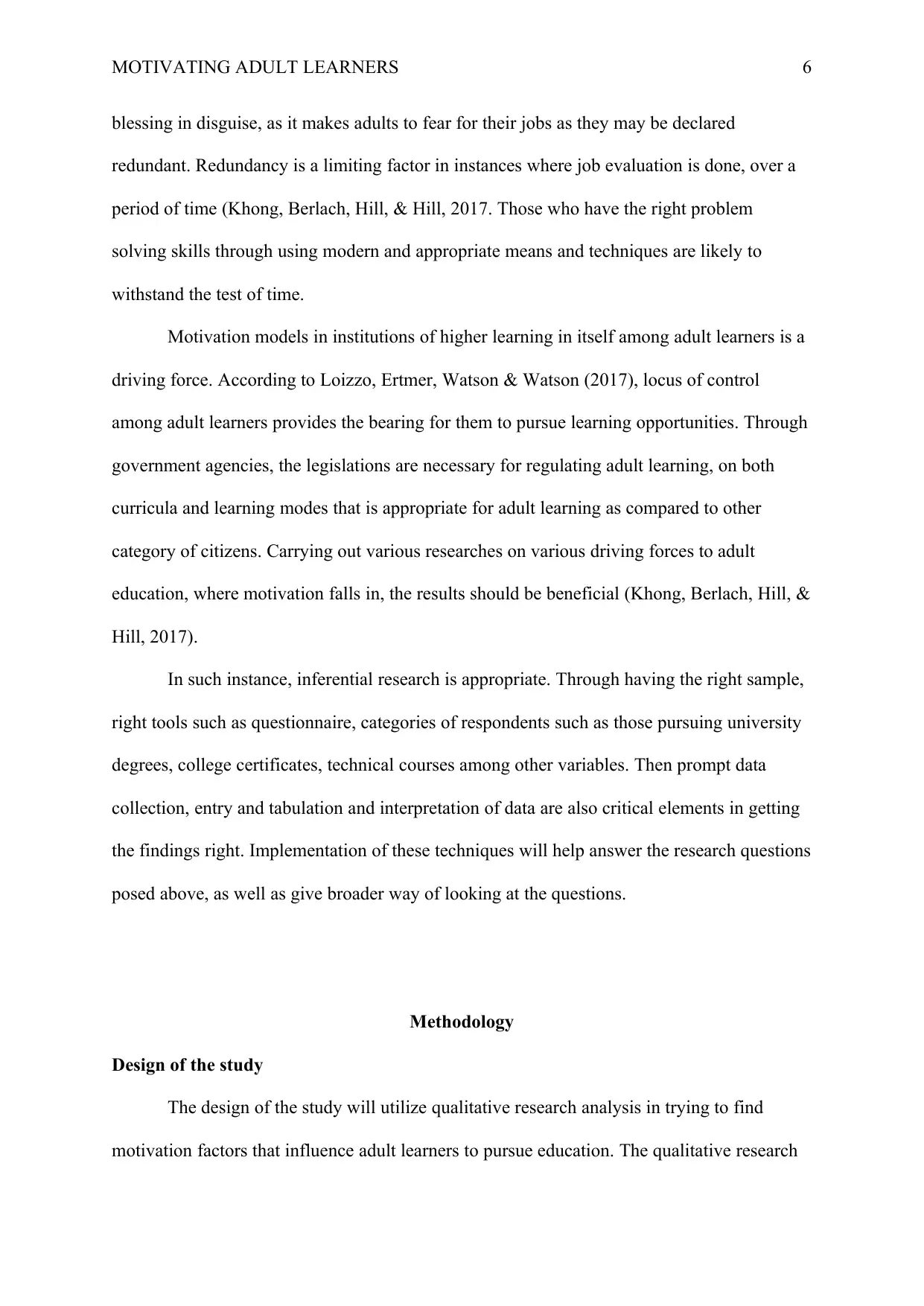
MOTIVATING ADULT LEARNERS
blessing in disguise, as it makes adults to fear for their jobs as they may be declared
redundant. Redundancy is a limiting factor in instances where job evaluation is done, over a
period of time (Khong, Berlach, Hill, & Hill, 2017. Those who have the right problem
solving skills through using modern and appropriate means and techniques are likely to
withstand the test of time.
Motivation models in institutions of higher learning in itself among adult learners is a
driving force. According to Loizzo, Ertmer, Watson & Watson (2017), locus of control
among adult learners provides the bearing for them to pursue learning opportunities. Through
government agencies, the legislations are necessary for regulating adult learning, on both
curricula and learning modes that is appropriate for adult learning as compared to other
category of citizens. Carrying out various researches on various driving forces to adult
education, where motivation falls in, the results should be beneficial (Khong, Berlach, Hill, &
Hill, 2017).
In such instance, inferential research is appropriate. Through having the right sample,
right tools such as questionnaire, categories of respondents such as those pursuing university
degrees, college certificates, technical courses among other variables. Then prompt data
collection, entry and tabulation and interpretation of data are also critical elements in getting
the findings right. Implementation of these techniques will help answer the research questions
posed above, as well as give broader way of looking at the questions.
Methodology
Design of the study
The design of the study will utilize qualitative research analysis in trying to find
motivation factors that influence adult learners to pursue education. The qualitative research
6
blessing in disguise, as it makes adults to fear for their jobs as they may be declared
redundant. Redundancy is a limiting factor in instances where job evaluation is done, over a
period of time (Khong, Berlach, Hill, & Hill, 2017. Those who have the right problem
solving skills through using modern and appropriate means and techniques are likely to
withstand the test of time.
Motivation models in institutions of higher learning in itself among adult learners is a
driving force. According to Loizzo, Ertmer, Watson & Watson (2017), locus of control
among adult learners provides the bearing for them to pursue learning opportunities. Through
government agencies, the legislations are necessary for regulating adult learning, on both
curricula and learning modes that is appropriate for adult learning as compared to other
category of citizens. Carrying out various researches on various driving forces to adult
education, where motivation falls in, the results should be beneficial (Khong, Berlach, Hill, &
Hill, 2017).
In such instance, inferential research is appropriate. Through having the right sample,
right tools such as questionnaire, categories of respondents such as those pursuing university
degrees, college certificates, technical courses among other variables. Then prompt data
collection, entry and tabulation and interpretation of data are also critical elements in getting
the findings right. Implementation of these techniques will help answer the research questions
posed above, as well as give broader way of looking at the questions.
Methodology
Design of the study
The design of the study will utilize qualitative research analysis in trying to find
motivation factors that influence adult learners to pursue education. The qualitative research
6
⊘ This is a preview!⊘
Do you want full access?
Subscribe today to unlock all pages.

Trusted by 1+ million students worldwide
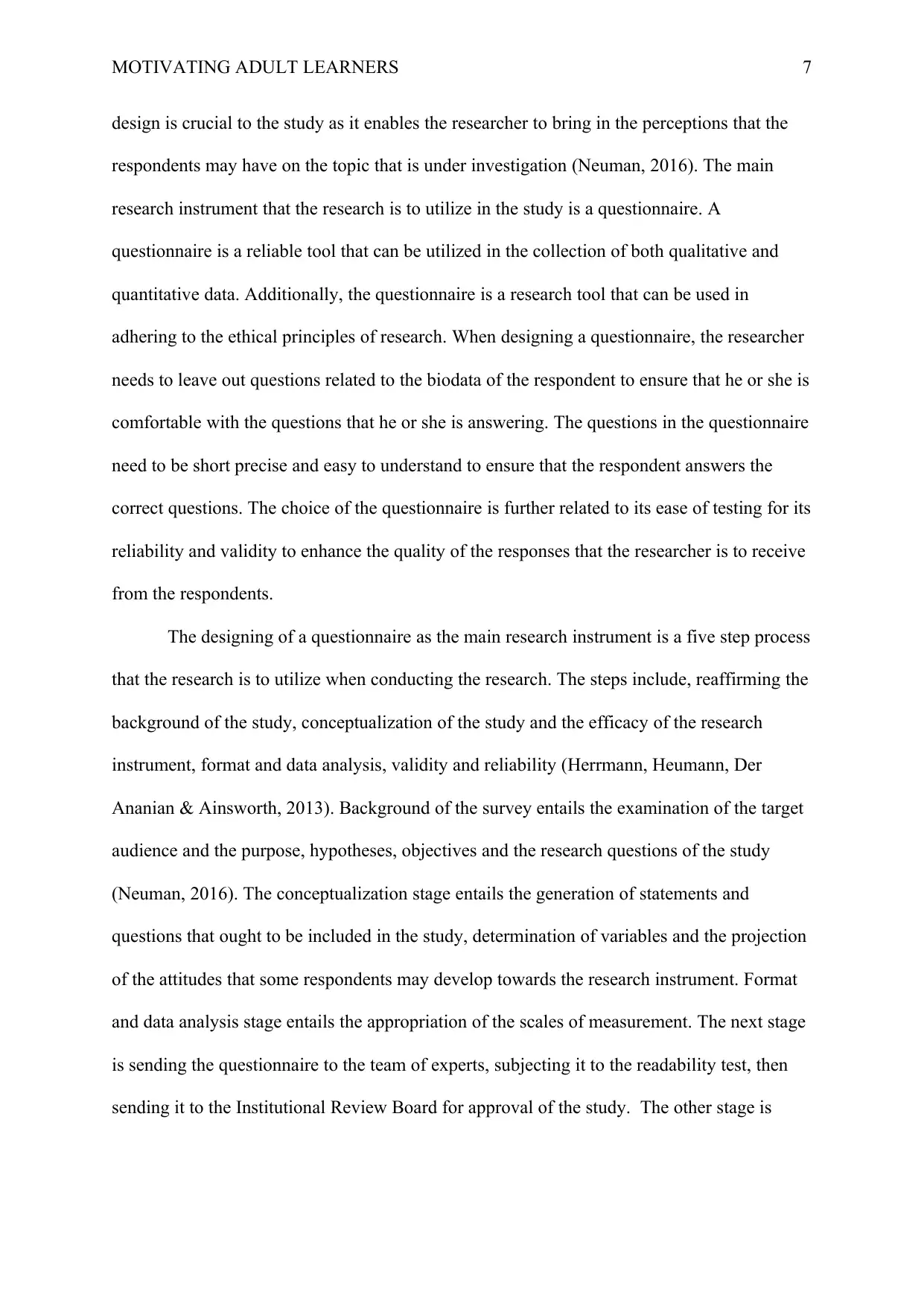
MOTIVATING ADULT LEARNERS
design is crucial to the study as it enables the researcher to bring in the perceptions that the
respondents may have on the topic that is under investigation (Neuman, 2016). The main
research instrument that the research is to utilize in the study is a questionnaire. A
questionnaire is a reliable tool that can be utilized in the collection of both qualitative and
quantitative data. Additionally, the questionnaire is a research tool that can be used in
adhering to the ethical principles of research. When designing a questionnaire, the researcher
needs to leave out questions related to the biodata of the respondent to ensure that he or she is
comfortable with the questions that he or she is answering. The questions in the questionnaire
need to be short precise and easy to understand to ensure that the respondent answers the
correct questions. The choice of the questionnaire is further related to its ease of testing for its
reliability and validity to enhance the quality of the responses that the researcher is to receive
from the respondents.
The designing of a questionnaire as the main research instrument is a five step process
that the research is to utilize when conducting the research. The steps include, reaffirming the
background of the study, conceptualization of the study and the efficacy of the research
instrument, format and data analysis, validity and reliability (Herrmann, Heumann, Der
Ananian & Ainsworth, 2013). Background of the survey entails the examination of the target
audience and the purpose, hypotheses, objectives and the research questions of the study
(Neuman, 2016). The conceptualization stage entails the generation of statements and
questions that ought to be included in the study, determination of variables and the projection
of the attitudes that some respondents may develop towards the research instrument. Format
and data analysis stage entails the appropriation of the scales of measurement. The next stage
is sending the questionnaire to the team of experts, subjecting it to the readability test, then
sending it to the Institutional Review Board for approval of the study. The other stage is
7
design is crucial to the study as it enables the researcher to bring in the perceptions that the
respondents may have on the topic that is under investigation (Neuman, 2016). The main
research instrument that the research is to utilize in the study is a questionnaire. A
questionnaire is a reliable tool that can be utilized in the collection of both qualitative and
quantitative data. Additionally, the questionnaire is a research tool that can be used in
adhering to the ethical principles of research. When designing a questionnaire, the researcher
needs to leave out questions related to the biodata of the respondent to ensure that he or she is
comfortable with the questions that he or she is answering. The questions in the questionnaire
need to be short precise and easy to understand to ensure that the respondent answers the
correct questions. The choice of the questionnaire is further related to its ease of testing for its
reliability and validity to enhance the quality of the responses that the researcher is to receive
from the respondents.
The designing of a questionnaire as the main research instrument is a five step process
that the research is to utilize when conducting the research. The steps include, reaffirming the
background of the study, conceptualization of the study and the efficacy of the research
instrument, format and data analysis, validity and reliability (Herrmann, Heumann, Der
Ananian & Ainsworth, 2013). Background of the survey entails the examination of the target
audience and the purpose, hypotheses, objectives and the research questions of the study
(Neuman, 2016). The conceptualization stage entails the generation of statements and
questions that ought to be included in the study, determination of variables and the projection
of the attitudes that some respondents may develop towards the research instrument. Format
and data analysis stage entails the appropriation of the scales of measurement. The next stage
is sending the questionnaire to the team of experts, subjecting it to the readability test, then
sending it to the Institutional Review Board for approval of the study. The other stage is
7
Paraphrase This Document
Need a fresh take? Get an instant paraphrase of this document with our AI Paraphraser
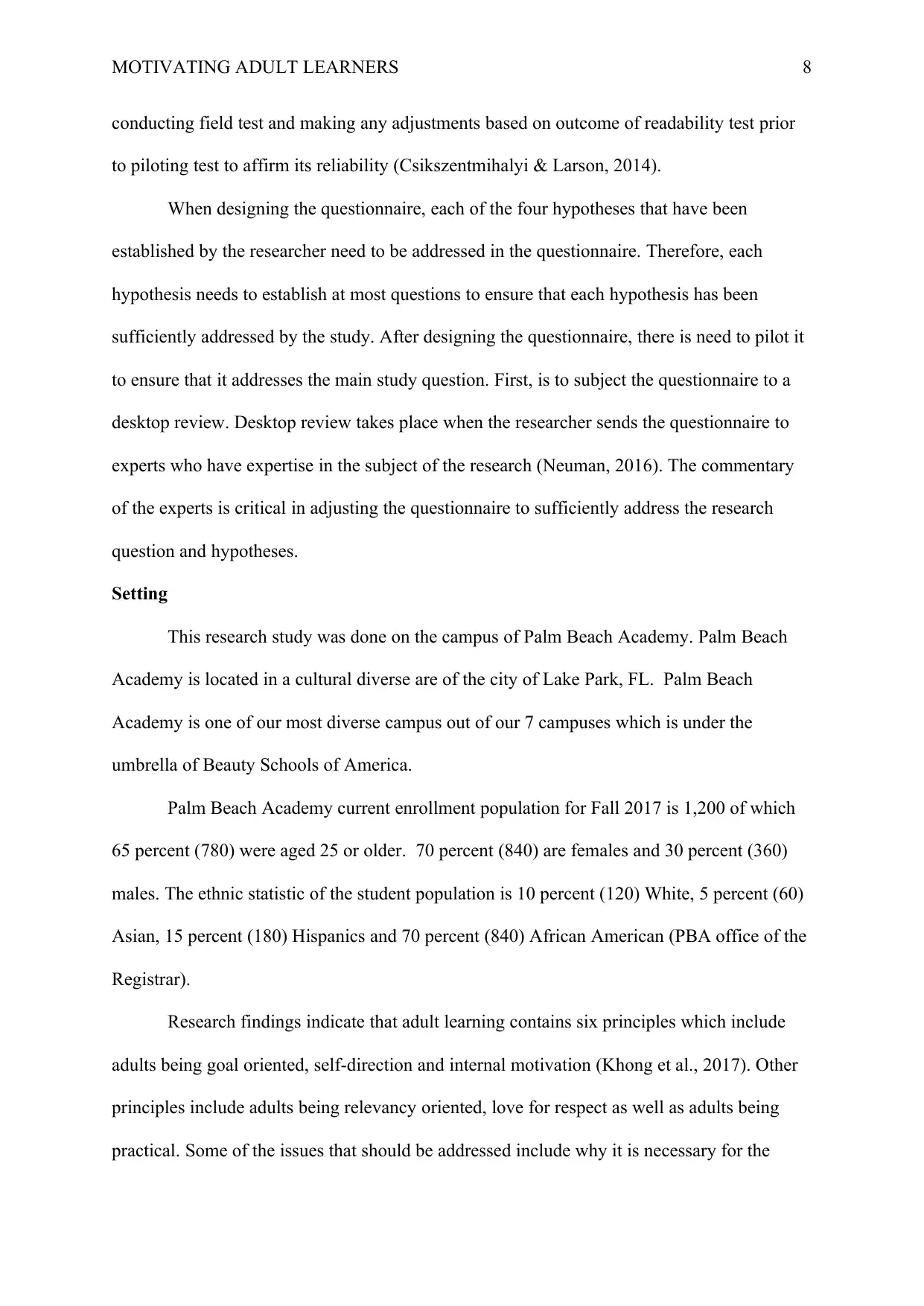
MOTIVATING ADULT LEARNERS
conducting field test and making any adjustments based on outcome of readability test prior
to piloting test to affirm its reliability (Csikszentmihalyi & Larson, 2014).
When designing the questionnaire, each of the four hypotheses that have been
established by the researcher need to be addressed in the questionnaire. Therefore, each
hypothesis needs to establish at most questions to ensure that each hypothesis has been
sufficiently addressed by the study. After designing the questionnaire, there is need to pilot it
to ensure that it addresses the main study question. First, is to subject the questionnaire to a
desktop review. Desktop review takes place when the researcher sends the questionnaire to
experts who have expertise in the subject of the research (Neuman, 2016). The commentary
of the experts is critical in adjusting the questionnaire to sufficiently address the research
question and hypotheses.
Setting
This research study was done on the campus of Palm Beach Academy. Palm Beach
Academy is located in a cultural diverse are of the city of Lake Park, FL. Palm Beach
Academy is one of our most diverse campus out of our 7 campuses which is under the
umbrella of Beauty Schools of America.
Palm Beach Academy current enrollment population for Fall 2017 is 1,200 of which
65 percent (780) were aged 25 or older. 70 percent (840) are females and 30 percent (360)
males. The ethnic statistic of the student population is 10 percent (120) White, 5 percent (60)
Asian, 15 percent (180) Hispanics and 70 percent (840) African American (PBA office of the
Registrar).
Research findings indicate that adult learning contains six principles which include
adults being goal oriented, self-direction and internal motivation (Khong et al., 2017). Other
principles include adults being relevancy oriented, love for respect as well as adults being
practical. Some of the issues that should be addressed include why it is necessary for the
8
conducting field test and making any adjustments based on outcome of readability test prior
to piloting test to affirm its reliability (Csikszentmihalyi & Larson, 2014).
When designing the questionnaire, each of the four hypotheses that have been
established by the researcher need to be addressed in the questionnaire. Therefore, each
hypothesis needs to establish at most questions to ensure that each hypothesis has been
sufficiently addressed by the study. After designing the questionnaire, there is need to pilot it
to ensure that it addresses the main study question. First, is to subject the questionnaire to a
desktop review. Desktop review takes place when the researcher sends the questionnaire to
experts who have expertise in the subject of the research (Neuman, 2016). The commentary
of the experts is critical in adjusting the questionnaire to sufficiently address the research
question and hypotheses.
Setting
This research study was done on the campus of Palm Beach Academy. Palm Beach
Academy is located in a cultural diverse are of the city of Lake Park, FL. Palm Beach
Academy is one of our most diverse campus out of our 7 campuses which is under the
umbrella of Beauty Schools of America.
Palm Beach Academy current enrollment population for Fall 2017 is 1,200 of which
65 percent (780) were aged 25 or older. 70 percent (840) are females and 30 percent (360)
males. The ethnic statistic of the student population is 10 percent (120) White, 5 percent (60)
Asian, 15 percent (180) Hispanics and 70 percent (840) African American (PBA office of the
Registrar).
Research findings indicate that adult learning contains six principles which include
adults being goal oriented, self-direction and internal motivation (Khong et al., 2017). Other
principles include adults being relevancy oriented, love for respect as well as adults being
practical. Some of the issues that should be addressed include why it is necessary for the
8
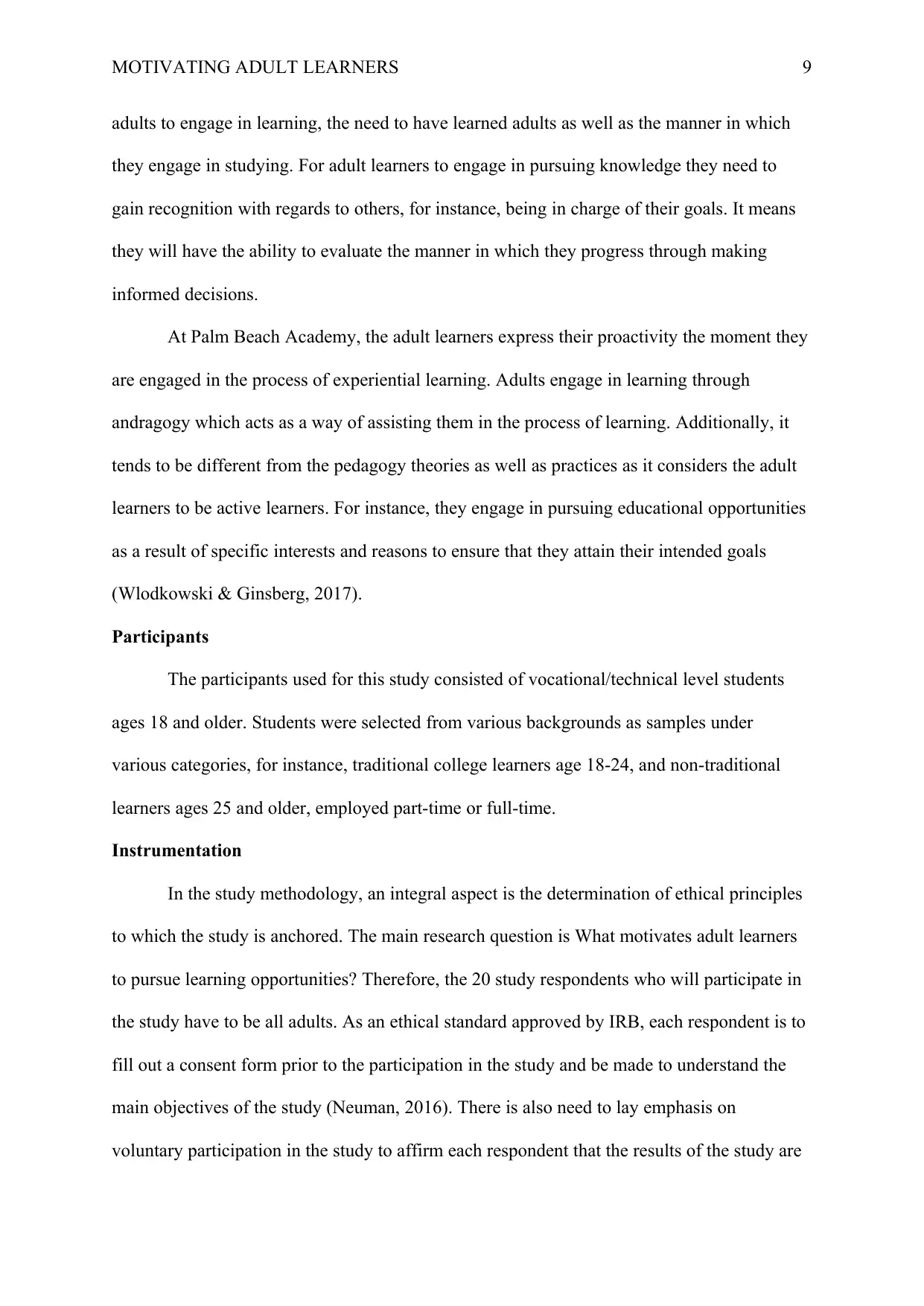
MOTIVATING ADULT LEARNERS
adults to engage in learning, the need to have learned adults as well as the manner in which
they engage in studying. For adult learners to engage in pursuing knowledge they need to
gain recognition with regards to others, for instance, being in charge of their goals. It means
they will have the ability to evaluate the manner in which they progress through making
informed decisions.
At Palm Beach Academy, the adult learners express their proactivity the moment they
are engaged in the process of experiential learning. Adults engage in learning through
andragogy which acts as a way of assisting them in the process of learning. Additionally, it
tends to be different from the pedagogy theories as well as practices as it considers the adult
learners to be active learners. For instance, they engage in pursuing educational opportunities
as a result of specific interests and reasons to ensure that they attain their intended goals
(Wlodkowski & Ginsberg, 2017).
Participants
The participants used for this study consisted of vocational/technical level students
ages 18 and older. Students were selected from various backgrounds as samples under
various categories, for instance, traditional college learners age 18-24, and non-traditional
learners ages 25 and older, employed part-time or full-time.
Instrumentation
In the study methodology, an integral aspect is the determination of ethical principles
to which the study is anchored. The main research question is What motivates adult learners
to pursue learning opportunities? Therefore, the 20 study respondents who will participate in
the study have to be all adults. As an ethical standard approved by IRB, each respondent is to
fill out a consent form prior to the participation in the study and be made to understand the
main objectives of the study (Neuman, 2016). There is also need to lay emphasis on
voluntary participation in the study to affirm each respondent that the results of the study are
9
adults to engage in learning, the need to have learned adults as well as the manner in which
they engage in studying. For adult learners to engage in pursuing knowledge they need to
gain recognition with regards to others, for instance, being in charge of their goals. It means
they will have the ability to evaluate the manner in which they progress through making
informed decisions.
At Palm Beach Academy, the adult learners express their proactivity the moment they
are engaged in the process of experiential learning. Adults engage in learning through
andragogy which acts as a way of assisting them in the process of learning. Additionally, it
tends to be different from the pedagogy theories as well as practices as it considers the adult
learners to be active learners. For instance, they engage in pursuing educational opportunities
as a result of specific interests and reasons to ensure that they attain their intended goals
(Wlodkowski & Ginsberg, 2017).
Participants
The participants used for this study consisted of vocational/technical level students
ages 18 and older. Students were selected from various backgrounds as samples under
various categories, for instance, traditional college learners age 18-24, and non-traditional
learners ages 25 and older, employed part-time or full-time.
Instrumentation
In the study methodology, an integral aspect is the determination of ethical principles
to which the study is anchored. The main research question is What motivates adult learners
to pursue learning opportunities? Therefore, the 20 study respondents who will participate in
the study have to be all adults. As an ethical standard approved by IRB, each respondent is to
fill out a consent form prior to the participation in the study and be made to understand the
main objectives of the study (Neuman, 2016). There is also need to lay emphasis on
voluntary participation in the study to affirm each respondent that the results of the study are
9
⊘ This is a preview!⊘
Do you want full access?
Subscribe today to unlock all pages.

Trusted by 1+ million students worldwide
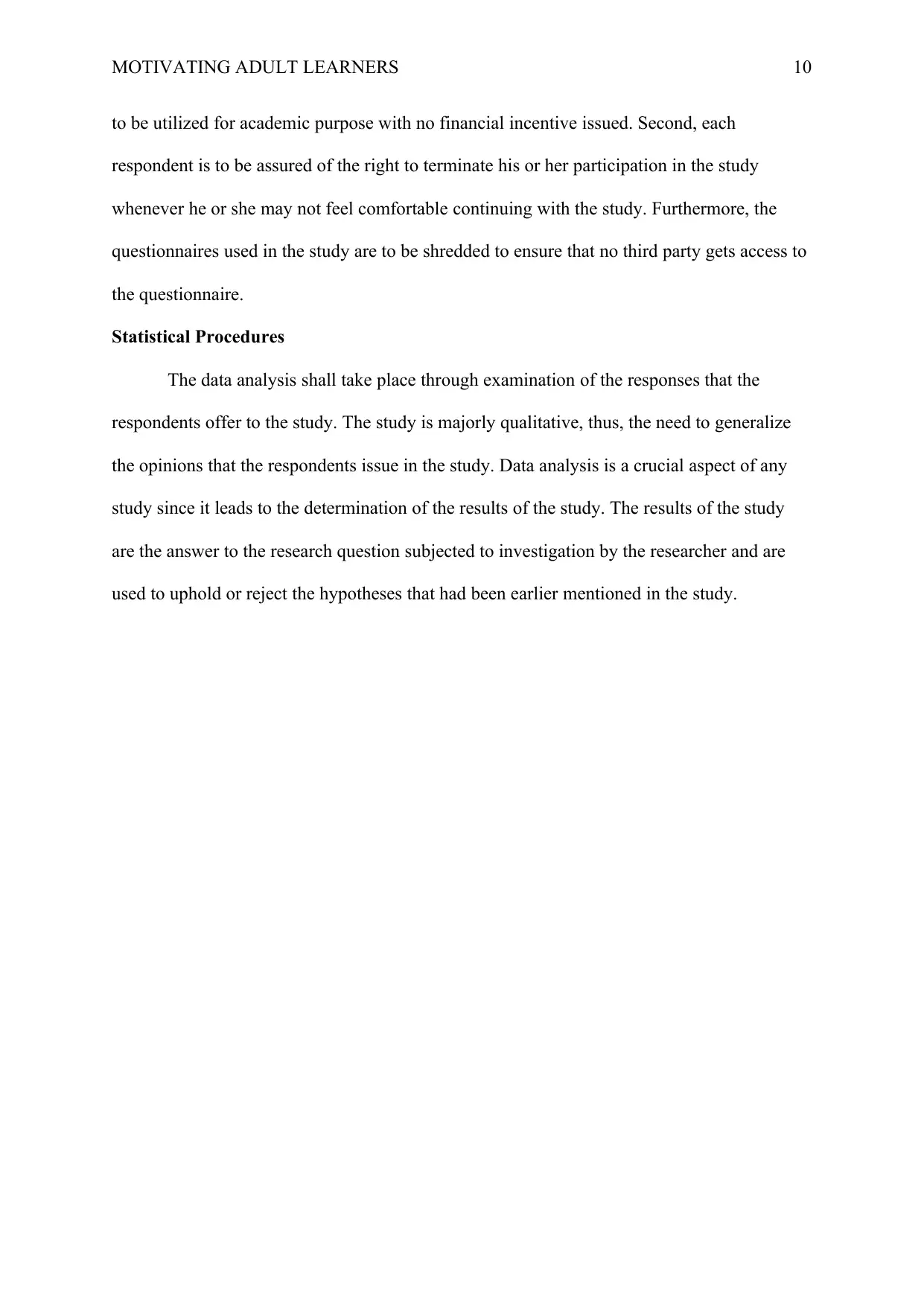
MOTIVATING ADULT LEARNERS
to be utilized for academic purpose with no financial incentive issued. Second, each
respondent is to be assured of the right to terminate his or her participation in the study
whenever he or she may not feel comfortable continuing with the study. Furthermore, the
questionnaires used in the study are to be shredded to ensure that no third party gets access to
the questionnaire.
Statistical Procedures
The data analysis shall take place through examination of the responses that the
respondents offer to the study. The study is majorly qualitative, thus, the need to generalize
the opinions that the respondents issue in the study. Data analysis is a crucial aspect of any
study since it leads to the determination of the results of the study. The results of the study
are the answer to the research question subjected to investigation by the researcher and are
used to uphold or reject the hypotheses that had been earlier mentioned in the study.
10
to be utilized for academic purpose with no financial incentive issued. Second, each
respondent is to be assured of the right to terminate his or her participation in the study
whenever he or she may not feel comfortable continuing with the study. Furthermore, the
questionnaires used in the study are to be shredded to ensure that no third party gets access to
the questionnaire.
Statistical Procedures
The data analysis shall take place through examination of the responses that the
respondents offer to the study. The study is majorly qualitative, thus, the need to generalize
the opinions that the respondents issue in the study. Data analysis is a crucial aspect of any
study since it leads to the determination of the results of the study. The results of the study
are the answer to the research question subjected to investigation by the researcher and are
used to uphold or reject the hypotheses that had been earlier mentioned in the study.
10
Paraphrase This Document
Need a fresh take? Get an instant paraphrase of this document with our AI Paraphraser
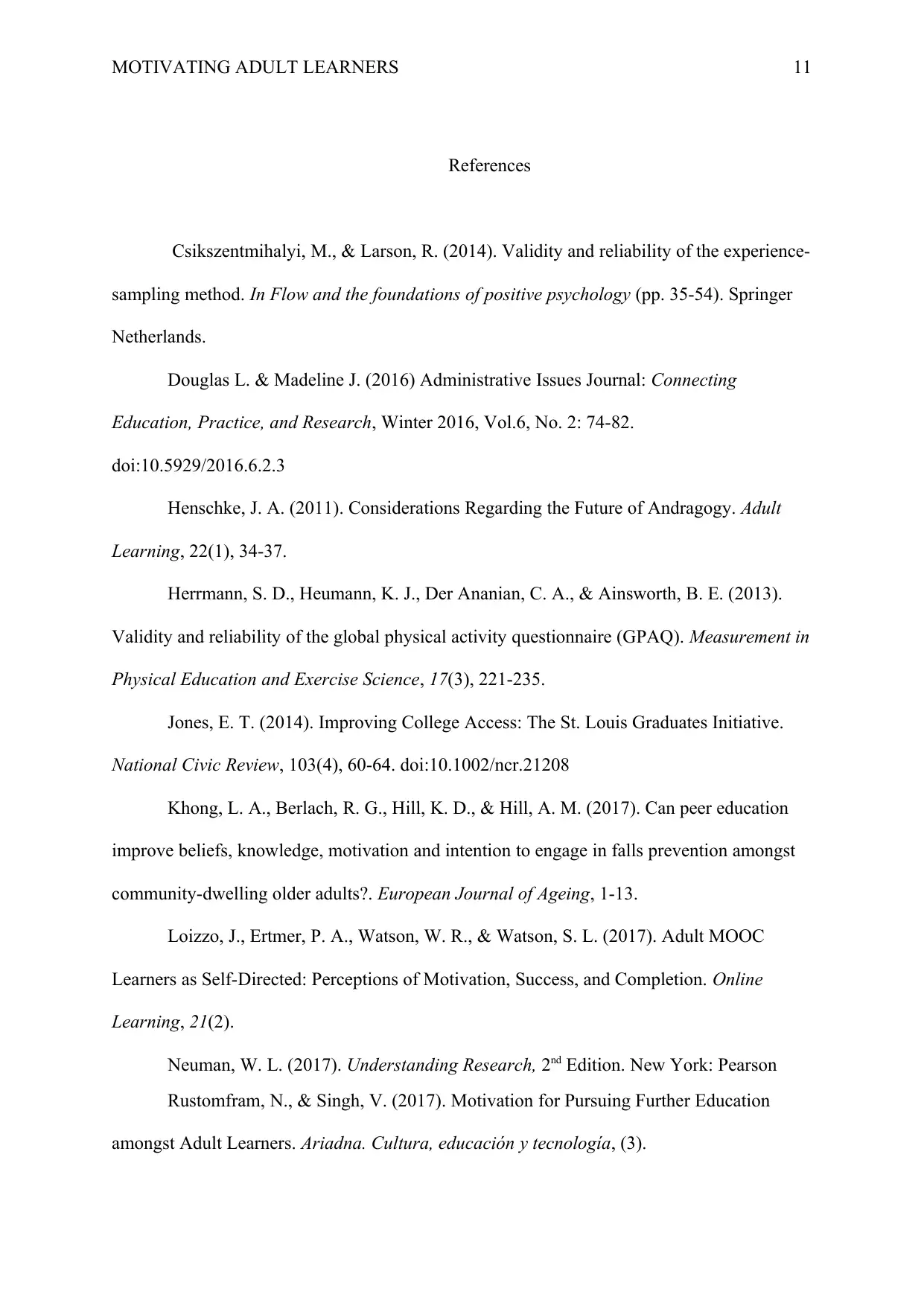
MOTIVATING ADULT LEARNERS
References
Csikszentmihalyi, M., & Larson, R. (2014). Validity and reliability of the experience-
sampling method. In Flow and the foundations of positive psychology (pp. 35-54). Springer
Netherlands.
Douglas L. & Madeline J. (2016) Administrative Issues Journal: Connecting
Education, Practice, and Research, Winter 2016, Vol.6, No. 2: 74-82.
doi:10.5929/2016.6.2.3
Henschke, J. A. (2011). Considerations Regarding the Future of Andragogy. Adult
Learning, 22(1), 34-37.
Herrmann, S. D., Heumann, K. J., Der Ananian, C. A., & Ainsworth, B. E. (2013).
Validity and reliability of the global physical activity questionnaire (GPAQ). Measurement in
Physical Education and Exercise Science, 17(3), 221-235.
Jones, E. T. (2014). Improving College Access: The St. Louis Graduates Initiative.
National Civic Review, 103(4), 60-64. doi:10.1002/ncr.21208
Khong, L. A., Berlach, R. G., Hill, K. D., & Hill, A. M. (2017). Can peer education
improve beliefs, knowledge, motivation and intention to engage in falls prevention amongst
community-dwelling older adults?. European Journal of Ageing, 1-13.
Loizzo, J., Ertmer, P. A., Watson, W. R., & Watson, S. L. (2017). Adult MOOC
Learners as Self-Directed: Perceptions of Motivation, Success, and Completion. Online
Learning, 21(2).
Neuman, W. L. (2017). Understanding Research, 2nd Edition. New York: Pearson
Rustomfram, N., & Singh, V. (2017). Motivation for Pursuing Further Education
amongst Adult Learners. Ariadna. Cultura, educación y tecnología, (3).
11
References
Csikszentmihalyi, M., & Larson, R. (2014). Validity and reliability of the experience-
sampling method. In Flow and the foundations of positive psychology (pp. 35-54). Springer
Netherlands.
Douglas L. & Madeline J. (2016) Administrative Issues Journal: Connecting
Education, Practice, and Research, Winter 2016, Vol.6, No. 2: 74-82.
doi:10.5929/2016.6.2.3
Henschke, J. A. (2011). Considerations Regarding the Future of Andragogy. Adult
Learning, 22(1), 34-37.
Herrmann, S. D., Heumann, K. J., Der Ananian, C. A., & Ainsworth, B. E. (2013).
Validity and reliability of the global physical activity questionnaire (GPAQ). Measurement in
Physical Education and Exercise Science, 17(3), 221-235.
Jones, E. T. (2014). Improving College Access: The St. Louis Graduates Initiative.
National Civic Review, 103(4), 60-64. doi:10.1002/ncr.21208
Khong, L. A., Berlach, R. G., Hill, K. D., & Hill, A. M. (2017). Can peer education
improve beliefs, knowledge, motivation and intention to engage in falls prevention amongst
community-dwelling older adults?. European Journal of Ageing, 1-13.
Loizzo, J., Ertmer, P. A., Watson, W. R., & Watson, S. L. (2017). Adult MOOC
Learners as Self-Directed: Perceptions of Motivation, Success, and Completion. Online
Learning, 21(2).
Neuman, W. L. (2017). Understanding Research, 2nd Edition. New York: Pearson
Rustomfram, N., & Singh, V. (2017). Motivation for Pursuing Further Education
amongst Adult Learners. Ariadna. Cultura, educación y tecnología, (3).
11
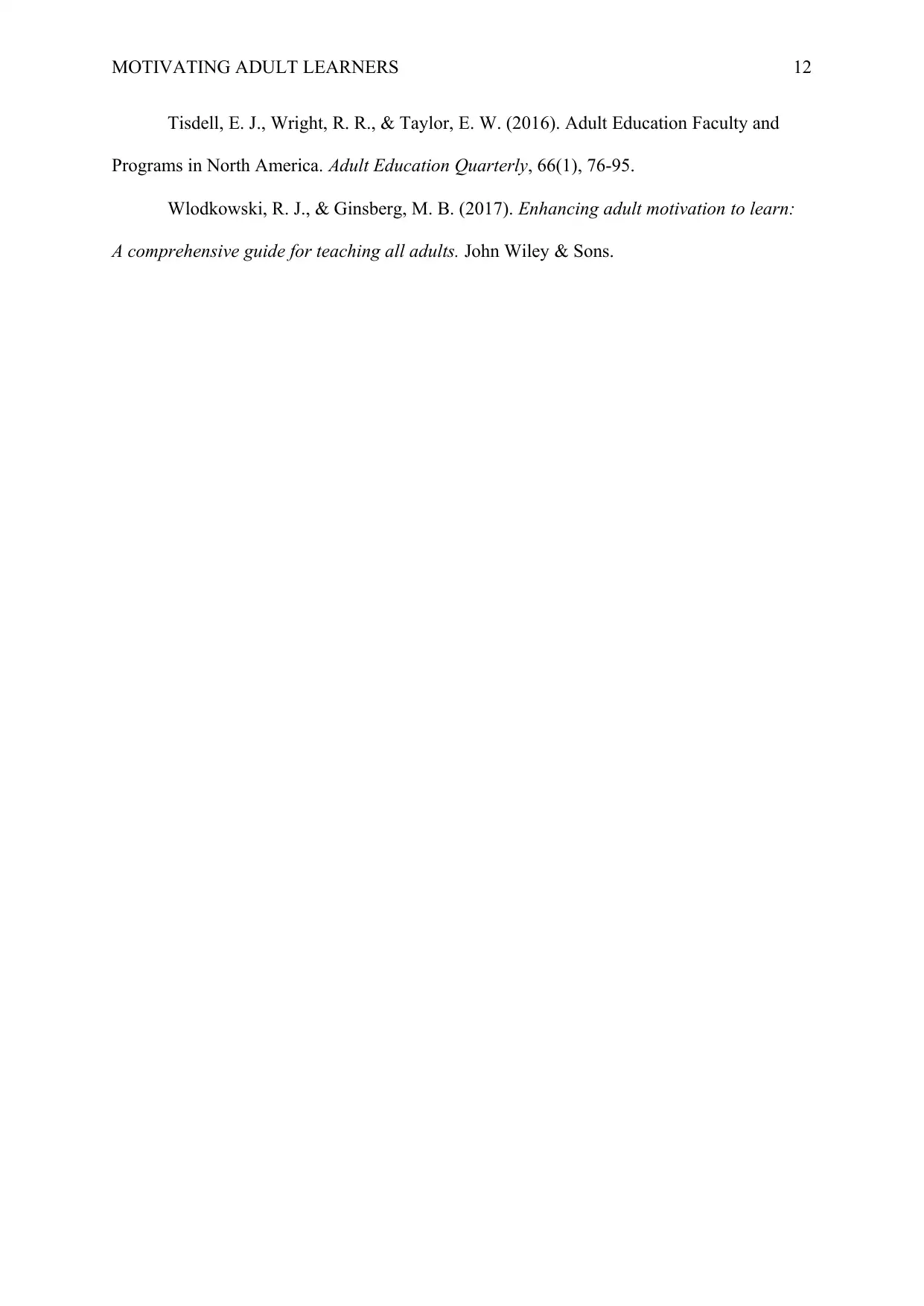
MOTIVATING ADULT LEARNERS
Tisdell, E. J., Wright, R. R., & Taylor, E. W. (2016). Adult Education Faculty and
Programs in North America. Adult Education Quarterly, 66(1), 76-95.
Wlodkowski, R. J., & Ginsberg, M. B. (2017). Enhancing adult motivation to learn:
A comprehensive guide for teaching all adults. John Wiley & Sons.
12
Tisdell, E. J., Wright, R. R., & Taylor, E. W. (2016). Adult Education Faculty and
Programs in North America. Adult Education Quarterly, 66(1), 76-95.
Wlodkowski, R. J., & Ginsberg, M. B. (2017). Enhancing adult motivation to learn:
A comprehensive guide for teaching all adults. John Wiley & Sons.
12
⊘ This is a preview!⊘
Do you want full access?
Subscribe today to unlock all pages.

Trusted by 1+ million students worldwide
1 out of 12
Related Documents
Your All-in-One AI-Powered Toolkit for Academic Success.
+13062052269
info@desklib.com
Available 24*7 on WhatsApp / Email
![[object Object]](/_next/static/media/star-bottom.7253800d.svg)
Unlock your academic potential
Copyright © 2020–2025 A2Z Services. All Rights Reserved. Developed and managed by ZUCOL.





